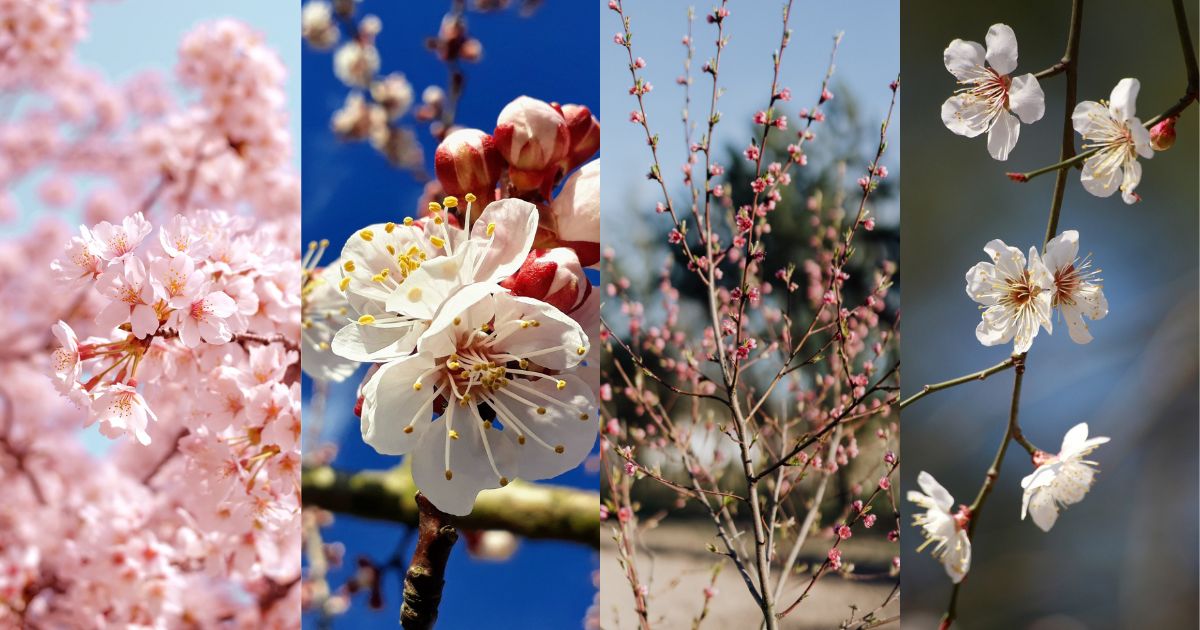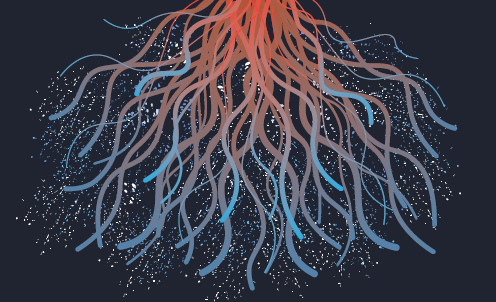Breaking Free from Comparison: The Wisdom of Oubaitori

Namita Davey
Digital Projects Lead & Mindful Explorer
March, 2024
In a society where comparison can often rob us of joy, we can once again turn to the intricate tapestry of Japanese culture for inspiration. A concept known as Oubaitori – (pronounced oh-buy-toe-ree), is symbolised by the four magnificent trees that blossom across Japan’s landscape in spring: cherry, apricot, peach, and plum. Adorning shades of pink, mauve, blush and white, it’s significant to observe each tree exhibits its own flowering patterns and produces distinct fruit. In fact, the word Oubaitori is written as a combination of the Japanese Kanji characters for these four trees.
桜梅桃李

While all these trees bear beautiful flowers that mature into delicious fruit, Oubaitori aims to honour the uniqueness of each tree. For example, a peach with its juicy-sweet flavour is distinctly different from the tangy sweetness of the plum; both are equally refreshing and satisfying to eat. Comparisons to determine which is better will just prove to be fruitless!
This botanical imagery serves as a poignant reminder for us to break free of the frequent tendency to compare ourselves to others and instead fully accept our own personal journeys.
In a world often dictated by conformity, further fuelled by curated images of perfection through social media – the concept of Oubaitori serves as a powerful antidote to the culture of comparison and self-doubt. It’s that gentle nudge that true feelings of self-worth and achievement come from within, not from external validation or from the pursuit of unattainable standards set by others.
How to drop the burden of comparison
Adopting the principles of Oubaitori requires intentional effort and practice, which is a journey in itself! While the steps below may not be new, they serve as quick checklist to initiate a shift in mindset:
- Awareness: Start by becoming aware of when you engage in comparison. Notice the thoughts and feelings that arise when you compare yourself to others in various aspects of your life.
- Challenge negative thoughts: If you catch yourself comparing, remember the uniqueness of each person’s journey and the futility of comparison. If you’re struggling because of comparison, treat yourself with the same kindness and compassion you would show a friend in a similar situation.
- Practice gratitude: Cultivate a sense of gratitude for your own unique qualities, experiences, and accomplishments. Regularly reflect on the things you appreciate about yourself and your life, rather than focusing on what you lack compared to others.
- Focus on personal growth: Shift your focus from comparing yourself to others to focusing on your own personal growth and development. Set goals that align with your values and aspirations and work towards achieving them at your own pace.
Oubaitori builds upon two other profound Japanese concepts of Ikigai and Kintsugi, as explored in earlier newsletters. These philosophies are intricately connected and share the goal of living our authentic selves. They encourage us to find purpose in our actions while also embracing all aspects of our lives, including failures and weaknesses. By acknowledging our experiences and the role they play in shaping our unique paths, we develop greater resilience and self-assurance.
Moreover, Oubaitori strengthens relationships and social dynamics by promoting mutual respect, diversity and acceptance rather than competition or envy. Instead of perceiving different views as a threat, we start to appreciate the unique perspective each person has to offer.
Whether this be in a personal or professional sense – the result is that, without fear of judgement or comparison, people become more willing to share their ideas. This in turn encourages creativity and growth at a personal and collective level.
Oubaitori isn’t just a word; it’s a transformative idea that we can tap into, helping us to cultivate a deeper sense of acceptance of ourselves and others – ultimately leading to a more inclusive and compassionate society. Just like the cherry, apricot, peach and plum tree, we too can all bloom in our own extraordinary way!
We’d love to hear from you if you would like to contribute an article to our Mindful Living content. Contact [email protected] for further details.
Share:
Related Posts

Why Would I Test Positive To Foods On A Dietary Antigen Test That I Don’t Eat?
Written by Precision Point Diagnostics | 2025 True food allergies are when the body develops antibodies against a particular food, or a related food. Patients

Mitochondria: The Overlooked Link in the Gut-Brain Axis
Written by Dr Sarah Daglis | 2025 The gut-brain axis is well-established, but there’s more to this dynamic relationship than meets the eye. A vital

Unlocking Respiratory Resilience Through Functional Medicine
Article written by Dr Michelle Clark Naturopathic Doctor Clinical Education Manager, FxMed Published 1 September 2024 People take supplements to improve or optimize their health.

AHCC: Unlocking the Immune Intelligence of Shiitake Mycelia
Article written by Jessica Sanders BSc. (Psy), Dip Nat, Dip Med Herb Technical Projects, FxMed Published 1 September 2024 People take supplements to improve or

Life After Weight Loss Meds
Kathi Head, ND February 20, 2025 You would have to have been spending glorious hours lying on the beach on a desert island not to

